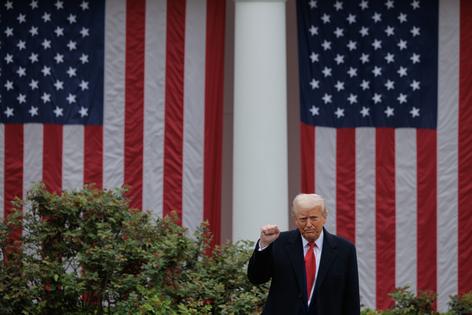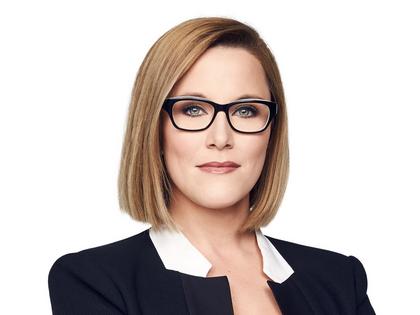Trillions of Reasons Why Trump Caved on Tariffs
Our long national nightmare is over. Or is it?
After the longest week of economic uncertainty and peril Americans have endured in a long time, President Donald Trump finally caved and announced a 90-day pause on his ham-fisted, hairbrained, ill-advised and ill-conceived trade war with the world.
The 10% baseline tariffs will stay, but the stiff increases will remain, while China — for their “lack of respect,” according to Trump — will see an even higher tariff of 125%.
Trump had insisted all along that he wouldn’t back down, imploring anxious Americans watching their retirement accounts deflate to “ BE COOL!”
But Americans were decidedly uncool as the stock market tanked and prices across the board on everyday goods were set to skyrocket.
The tariffs were doomed from the start, nearly every economist agreed. But knowing Trump — his longtime obsession with tariffs, his history of refusing to back down, his disinterest in expert advice — one has to wonder what sent him over the edge, to crawl back his signature economic “achievement.”
According to him, people were getting “yippy” and “afraid.” So was it the stock market?
The indexes saw trillions — with a “T” — evaporate over the course of a week thanks to the economic uncertainty Trump’s tariffs wreaked on the world. That will make people yippy for sure.
JP Morgan CEO Jamie Dimon warned a recession was going to be “a likely outcome.”
Hedge fund manager and investor Mark Spitznagel also warned of a coming “80% crash when this is over.”
And Trump reportedly got spooked on Wednesday at a meeting with Treasury Secretary Scott Bessent and others who warned of ominous developments in the bond market.
Trump’s own donors were reportedly “terrified” and turning bearish, too.
Billionaire GOP donor Ken Langone complained, “I don’t understand the goddamn formula!”
Billionaire investor Bill Ackman begged Trump to walk the tariffs back in order to avoid “economic nuclear war.”
Even Trump’s most important donor, Elon Musk, reportedly attempted an intervention to get Trump to change course, to no avail.
Maybe it was the polls, which were abysmal.
A recent Wall Street Journal poll found 54% of Americans opposed Trump’s tariffs, while only 42% were in favor. His net approval rating on the economy went from plus five points in 2017 to minus 12 points now.
Or perhaps it was the growing list of Republican lawmakers who were rightly worried about the economic and political impact of the tariff folly, after hearing from anxious constituents back home.
Sen. Ron Johnson lamented, “I still don’t know exactly what [Trump’s] total strategy is.”
Rep. Don Bacon introduced legislation to return control of tariffs to Congress.
Sen. Rand Paul called the whole tariff conversation “fundamentally backwards and upside down.” “It’s based on a fallacy,” he said.
Sen. Thom Tillis pointedly asked U.S. Trade Representative Jamieson Greer, “Whose throat do I get to choke if this proves to be wrong?” Yikes.
Even Speaker Mike Johnson was caught checking a Drudge Report headline predicting a stock market crash while attending a Republican fundraiser.
Maybe it was Trump’s supporters — people like Canadian entrepreneur Kevin O’Leary, who urged him to sign a zero-tariff deal with the European Union. Or Barstool Sports’ Dave Portnoy, who said he’d vote for Democrats if Trump’s tariffs kept mucking with the markets.
Maybe it was the strong rebuke from conservative — and often friendly — media. National Review had this damning indictment:
“What has happened since last Thursday is hard to fathom. Based on an ever-shifting series of rationales, characterized by an embarrassing methodology, and punctuated with an extraordinary arrogance toward the country’s constitutional order, the Trump administration has alienated our global allies, discombobulated our domestic businesses, decimated our capital markets, and increased the likelihood of serious recession.”
Fox News and Fox News Business hosts were warning of political and economic devastation.
And rightwing voices like Ben Shapiro were loudly objecting to Trump’s “bad economic policy.”
So, how did we go from “MY POLICIES WILL NEVER CHANGE,” which Trump said just last week, to a 90-day pause and sudden willingness to negotiate? We’ll probably never know. Because Trump will laughably insist he didn’t actually back down, this all went according to plan, and it was a huge success.
But let’s be honest — there were a trillion reasons.
========
(S.E. Cupp is the host of "S.E. Cupp Unfiltered" on CNN.)
©2025 S.E. Cupp. Distributed by Tribune Content Agency, LLC.




































Comments